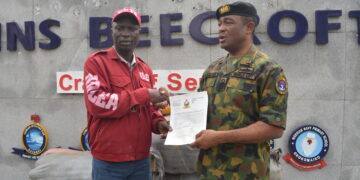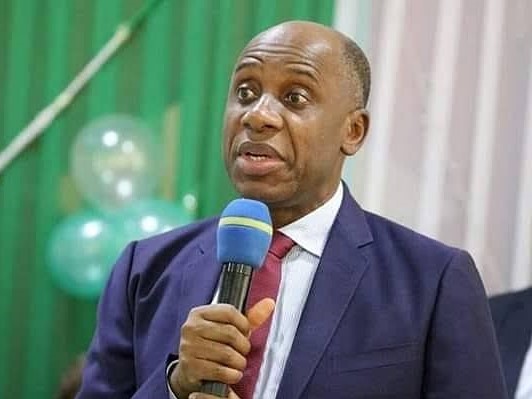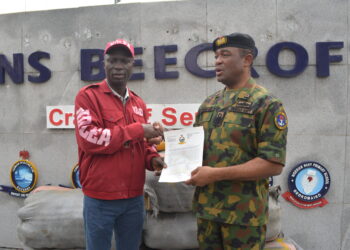The Federal Government has stated that prioritizing the completion of on-going railway projects and commencing of new ones would spur economic growth, while facilitating trade in Nigeria and with her West African neighbors.
The Minister of Transportation, Rt. Hon. Chibuike Rotimi Amaechi, stated this while presenting a total capital budget of N 147, 931, 691, 294, and overhead of N 358, 799, 998, as the 2022 Budget proposal of the Federal Ministry of Transportation to the Joint Committee of the Senate and House of Representatives on Land and Marine Transport at the National Assembly Complex in Abuja
“We will continue to construct more rail to connect other African or West African countries who are involved in rail management. The moment we do this logistics so that from point A to B, you can move cargo, you can move human beings, you can move trade,” the Minister said.
During the interactive session with the Joint Committee members, Amaechi stressed on the need for the members to support government drive the on-going dry ports projects across the country, which include the Baro Dry Port and Lokoja River Port.
He said that the dry ports would only thrive if an interface or linkage of the proposed rail lines were completed as Rivers Benue and Niger have a depth of 3 meters and only barges and tugboats can operate within such parameters.
“Railway is the key to Baro, railway is the key to Lokoja, whatever you produce, you can put it on top of that train, if you can excavate it and put it on top, that rail will take it to where you want it to go. So, our intention was if we can take railway to everywhere in Nigeria, we would have peace, if it is passengers, it will have, if it is cargo, it will have,” Amaechi said.
Reacting to “Why rail line should lead to Maradi in Niger Republic Amaechi said construction of the Standard Gauge line will enable interconnectivity with countries in the West Africa sub region for the promotion of trade and commerce.”
He also explained that Kano-Maradi was not borne out of his personal ambition but rather a survey which had been carried out by previous administrations and government been a continuum, he only deemed it fit to implement the plan taking into consideration the viability of the project when completed. Besides, he further explained that the rail linkage that gets to Maradi is only 20 kilometres
On the issue of why the Eastern rail line was narrow gauge and not standard gauge, the Minister explained that he had two approvals from President Muhammadu Buhari for narrow gauge and standard gauge. But since getting the money to reconstruct the narrow gauge is easier, it made economic sense to connect the whole country by narrow gauge while still sourcing for funds to do the standard gauge.
Furthermore, the Minister explained that the main difference between the narrow gauge and the standard gauge was merely speed. While the former does 100 km/h, the latter does 120 km/h.
Reacting to the issue of loans, the Minister informed that the only money borrowed so far is the $ 1.4 billion spent on Lagos – Ibadan rail, explaining that loan approvals do not translate to cash.
According to the Minister, thus far, the completed and flagged-off rail corridors of Lagos-Ibadan, Warri-Itakpe, Abuja-Kaduna for commercial operations has employed over 500 skilled workers, 1 million indirect employments not forgetting to mention commercial activities that have received a stimulus along these corridors.
Responding to reasons behind the cut in budgetary submission of the Nigeria Railway Corporation (NRC) from 18 billion in 2021 to 7 billion naira in 2022, the Transport Minister said, “The NRC must move from being dependent on government to being dependent on themselves. I am not saying they are not doing well. After all, we are getting 350 million now from Abuja -Kaduna ….. It was 70 million.”
He further disclosed that from the proceeds, the Ministry has been able to sustain work along other rail corridors and cleared that the Managing Director, NRC, to see and run the Corporation as though it was a personal business in order to generate more funds for government while a charting a course for self-reliance.
In her contribution on the on-going rail projects, the Minister of State for Transportation, Sen. Gbemisola Ruqayyah Saraki, said that the rail projects were not personal, as against public opinion.
She added that with the ratification of the African Continental Free Trade Area (AfCFTA) Agreement, the proposed and on-going rail projects positions Nigeria to be more competitive regionally.
The Minister was accompanied by: the Permanent Secretary, Federal Ministry of Transportation (FMT), Dr. Magdalene Ajani, the Director, Maritime Safety and Security, FMT, Dr. Paul Adalikwu, Director, Finance and Accounts, FMT, Umar Hassan, Director, Special Duties, FMT, Kafayat Salami, Director, Legal Services, FMT, Pius Oteh, Director, Road Transport and Mass Transit, FMT, Mary Udu-Ejembi,
Others are the Managing Director NRC, Fidet Okhiria; Acting Managing Director, Nigerian Ports Authorit, Mohammed Bello Koko; DG Nigerian Maritime Administration and Safety Agency, Bashir Jamoh; Rector, Maritime Academy of Nigeria, Emmanuel Effedua; Registrar, Council for Regulation of Freight Forwarding in Nigeria, Sam Nwakohu; DG Nigerian Institute of Transport Technology, Bayero Salih-Farah and others.

































































